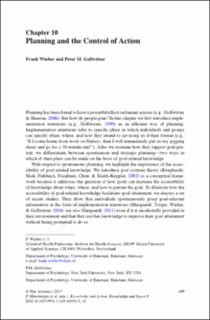Please use this identifier to cite or link to this item:
https://doi.org/10.21256/zhaw-2723| Publication type: | Book part |
| Type of review: | Editorial review |
| Title: | Planning and the control of action |
| Authors: | Wieber, Frank Gollwitzer, Peter M. |
| DOI: | 10.21256/zhaw-2723 10.1007/978-3-319-44588-5_10 |
| Published in: | Knowledge and action |
| Editors of the parent work: | Werlen, Benno Suarsana, Laura Meusburger, Peter |
| Page(s): | 169 |
| Pages to: | 183 |
| Issue Date: | 2017 |
| Series: | Knowledge and space |
| Series volume: | 9 |
| Publisher / Ed. Institution: | Springer |
| Publisher / Ed. Institution: | Cham |
| ISBN: | 978-3-319-44587-8 978-3-319-44588-5 |
| Language: | English |
| Subjects: | Goals; Plans; Motivation; Action |
| Subject (DDC): | 150: Psychology |
| Abstract: | Planning has been found to have a powerful effect on human actions (e.g., Gollwitzer & Sheeran, 2006 ). But how do people plan? In this chapter we first introduce implementation intentions (e.g., Gollwitzer, 1999 ) as an efficient way of planning. Implementation intentions refer to specific plans in which individuals and groups can specify when, where, and how they intend to act using an if-then format (e.g., “If I come home from work on Fridays, then I will immediately put on my jogging shoes and go for a 30-minute run!”). After we examine how they support goal pursuit, we differentiate between spontaneous and strategic planning—two ways in which if–then plans can be made on the basis of goal-related knowledge. With respect to spontaneous planning, we highlight the importance of the accessibility of goal-related knowledge. We introduce goal systems theory (Kruglanski, Shah, Fishbach, Friedman, Chun, & Sleeth-Keppler, 2002 ) as a conceptual framework because it addresses the question of how goals can increase the accessibility of knowledge about when, where, and how to pursue the goal. To illustrate how the accessibility of goal-related knowledge facilitates goal attainment, we discuss a set of recent studies. They show that individuals spontaneously grasp goal-relevant information in the form of implementation intentions (Marquardt, Tröger, Wieber, & Gollwitzer, 2016 ; see also Marquardt, 2011 ) even if it is incidentally provided in their environment and that they use this knowledge to improve their goal attainment without being prompted to do so. |
| URI: | https://digitalcollection.zhaw.ch/handle/11475/9959 |
| Fulltext version: | Published version |
| License (according to publishing contract): | CC BY 4.0: Attribution 4.0 International |
| Departement: | School of Health Sciences |
| Organisational Unit: | Institute of Public Health (IPH) |
| Appears in collections: | Publikationen Gesundheit |
Files in This Item:
| File | Description | Size | Format | |
|---|---|---|---|---|
| Wieber-Gollwitzer2017_Chapter_PlanningAndTheControlOfAction.pdf | 225.94 kB | Adobe PDF |  View/Open |
Show full item record
Wieber, F., & Gollwitzer, P. M. (2017). Planning and the control of action. In B. Werlen, L. Suarsana, & P. Meusburger (Eds.), Knowledge and action (pp. 169–183). Springer. https://doi.org/10.21256/zhaw-2723
Wieber, F. and Gollwitzer, P.M. (2017) ‘Planning and the control of action’, in B. Werlen, L. Suarsana, and P. Meusburger (eds) Knowledge and action. Cham: Springer, pp. 169–183. Available at: https://doi.org/10.21256/zhaw-2723.
F. Wieber and P. M. Gollwitzer, “Planning and the control of action,” in Knowledge and action, B. Werlen, L. Suarsana, and P. Meusburger, Eds. Cham: Springer, 2017, pp. 169–183. doi: 10.21256/zhaw-2723.
WIEBER, Frank und Peter M. GOLLWITZER, 2017. Planning and the control of action. In: Benno WERLEN, Laura SUARSANA und Peter MEUSBURGER (Hrsg.), Knowledge and action. Cham: Springer. S. 169–183. ISBN 978-3-319-44587-8
Wieber, Frank, and Peter M. Gollwitzer. 2017. “Planning and the Control of Action.” In Knowledge and Action, edited by Benno Werlen, Laura Suarsana, and Peter Meusburger, 169–83. Cham: Springer. https://doi.org/10.21256/zhaw-2723.
Wieber, Frank, and Peter M. Gollwitzer. “Planning and the Control of Action.” Knowledge and Action, edited by Benno Werlen et al., Springer, 2017, pp. 169–83, https://doi.org/10.21256/zhaw-2723.
Items in DSpace are protected by copyright, with all rights reserved, unless otherwise indicated.